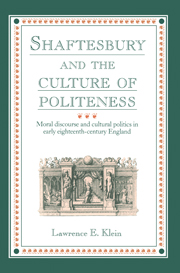 Shaftesbury and the Culture of Politeness
Shaftesbury and the Culture of Politeness 8 - The critique of the Church
Published online by Cambridge University Press: 13 March 2010
Summary
“Awefulness”
In a free nation, according to Shaftesbury, “the Awefulness of a Church” could not offer shelter to “Imposture” simply because the “impartial and free Censure of Manners,” characteristic of free nations, deflated bogus religious and ecclesiastical claims. It is indicative that Shaftesbury fixed on “Awefulness” as the ecclesiastical trait sheltering “Imposture.” “Awefulness,” and awesomeness, referred most immediately to a certain kind of impact on a beholder: the capacity to create feelings of dread or veneration. Thus, Church “Awefulness” implied specific relations between institution and individual: an “aweful” Church had an overwhelming majesty and an intimidating authority, to which the appropriate response was meekness, passivity, and silence. The institution's imposing qualities, which suppressed questioning and doubt, were intrinsically related to its capacity to nurture imposture. Because such a Church was not conductive to liberty and open discourse, it could not encourage the development of autonomous moral agents.
Indeed, the interactive structures sponsored by an “aweful” Church were fundamentally unsociable. As we have seen, Shaftesbury assigned a paradigmatic value to conversation among equal and autonomous agents just as he deprecated discursive situations marked by inequality and domination. In consequence, figures of discursivity and sociability informed his wider social and cultural understanding. In the Church, he saw an unfortunate model of human interaction generating a distorted style of discourse; in particular, he saw the condescending relationship of preacher to auditor generating a condescendingly magisterial and pedantic discourse. This chapter seeks to explore how Shaftesbury performed a critique of the Church in such discursive and cultural terms.
- Type
- Chapter
- Information
- Shaftesbury and the Culture of PolitenessMoral Discourse and Cultural Politics in Early Eighteenth-Century England, pp. 154 - 174Publisher: Cambridge University PressPrint publication year: 1994
- 1
- Cited by


